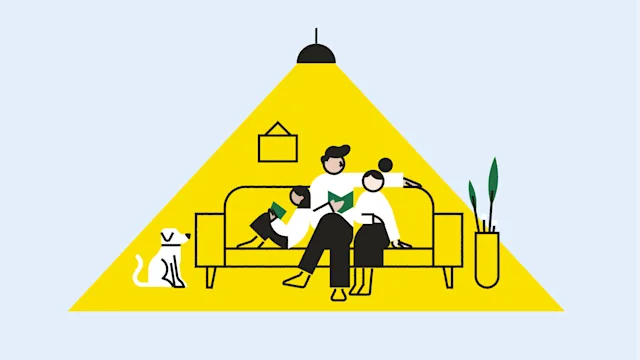Key takeaways:
The ability to focus is important to complete daily tasks, like reading directions and working on projects.
Strategies like minimizing multitasking, creating to-do lists, and scheduling breaks may improve your focusing skills.
Smart phones, medical conditions, and lack of sleep can disrupt your ability to focus.
Are you finding it harder to focus these days? You’re not alone. According to research, our ability to pay attention is falling fast.
Your ability to focus plays an important role in your life every day. You need it to read instructions, drive a car, take tests, and make difficult decisions.
If you’re having trouble paying attention, you might misplace things more often or forget an important step in a work project. It can leave you feeling let down and frustrated. If you’ve been feeling this way lately, know that there are things you can do to help.
Search and compare options
How can you improve your focus and attention?
Research shows that there are steps you can take to improve your focus. Here are 9 strategies to sharpen your focus.
1. Minimize multitasking
Multitasking involves juggling two or more tasks at the same time. You’re in a meeting, answering texts, while working on your grocery list. It may feel like you’re getting things done, but it’s not efficient.
People who multitask tend to complete tasks at a slower pace and with less accuracy, research suggests. It may seem counterintuitive, but you can get more done if you tackle one task at a time.
Use these tips to avoid multitasking:
Block out time to complete one task only.
Tell colleagues you don’t want to be disturbed during that time.
Set an alarm to let you know when time’s up.
Turn off notifications for emails, social media, and so forth.
Turn off your phone.
Schedule a specific time of day for certain tasks, like only checking social media first thing in the morning and after work.
Say no to a new project until you’ve completed your tasks for the day.
Schedule a time to declutter your desk or workspace to eliminate distractions.
2. Meditate
Meditation offers a wide range of benefits that can lengthen your attention span. Research suggests it can improve your working memory, reduce ruminating thoughts, and curb distractions. Plus, it lowers stress and anxiety.
Read more like this
Explore these related articles, suggested for readers like you.
If you’re new to meditation, try one of these 15 meditation apps. You can use them to kickstart your day, relax before bedtime, or for 10-minute breaks at work.
3. Exercise regularly
Exercise is good for your body and your brain. Studies suggest that active individuals are able to focus on their environment more clearly and process information more quickly. Aerobic exercise seems to work better for focus than stretching and toning exercises. Aerobic exercise or “cardio” is physical activity that elevates your heart rate and breathing.
If you’re new to exercising, talk to your healthcare provider before starting an aerobic exercise program. When you’re ready, aim for 30 minutes a day.
What you decide to do depends on your fitness level. Here are some aerobic activity ideas:
Gardening
Walking
Hiking
Cycling
Ballroom dancing or Zumba
Tennis
Swimming or water aerobics
4. Establish a to-do list
To-do lists are great time management tools. They can help you organize your tasks in order of importance so you can focus on one thing at a time.
The best to-do list tool is the one that works for you. Some people prefer to jot down tasks on a piece of paper. Others would rather create a digital list on their computer or use a task management app.
Here are a few tips for effective to-do lists:
Make separate lists for work and home.
Break down tasks into smaller tasks.
Be specific. For example, instead of “finish project,” write down each step to finish the project.
Try to only write down the tasks you can complete on that day.
5. Try a small amount of caffeine
A little caffeine can go a long way toward increasing focus. Low to moderate amounts of caffeine may have cognitive benefits such as:
Raising your ability to concentrate
Boosting short-term memory
Lowering mental fatigue
Bear in mind that some people are more sensitive to caffeine’s effects than others. The FDA says healthy adults should drink no more than 400 mg a day. That’s about 4 to 5 cups of coffee.
You know you’ve had too much caffeine if you start to feel jittery, headachy, or can’t sleep. Cut back until you feel more alert without any negative side effects.
6. Take breaks
Taking breaks can reset your focus so you can get more done. One way to schedule breaks into your day is with the pomodoro method. The pomodoro technique promotes intervals of focused work with scheduled breaks in between.
Here’s a guide:
Pick a task from your to-do list.
Set a timer and work on it for 25 minutes.
Take a 5-minute break.
Repeat four times.
After four intervals, take a 15- to 30-minute break.
If 25 minutes is too short, try 50-minute work intervals with 10-minute breaks.
Use your breaks to do something enjoyable like catch up on social media, watch funny videos, or go for a walk. Whatever you need to refuel your brain is fair game.
7. Listen to the right music
And by the “right music” we don’t mean classical necessarily. According to research, you’re more apt to remain focused if you like the music playing in the background. In other words, music you enjoy increases focus; music you don’t enjoy decreases it.
Of course, you probably don’t want to blast Beyoncé for all your coworkers to hear. Play music softly at your desk or put on your headphones. Choose from your favorite playlists. If you find that songs with lyrics are too distracting, look for instrumental versions.
8. Train your brain
Did you know you may be able to train your brain to improve concentration? All it takes is 15 minutes, 5 days a week, according to one study. Brain games not only raise your ability to focus, they boost your processing speeds, problem-solving skills, and memory.
Brain-training activities include:
Checkers
Chess
Dominoes
Sudoku
Jigsaw puzzles
Crossword puzzles
Trivia
9. Get enough sleep
Your brain needs a good night of sleep to function optimally. Without it, you’re more likely to lose concentration. Lack of sleep can also affect your working memory, long-term memory, and decision making.
The average adult needs 7 to 9 hours of shuteye every night.
If you have trouble sleeping, try these strategies:
Put your electronics away an hour before bed.
Go to bed at the same time each night and get up at the same time each morning.
Get sunlight or bright light first thing.
Avoid caffeine up to 6 hours before hitting the sack.
Keep your room cool and dark.
Avoid alcohol and big, spicy meals before bed.
10. Take care of your body
What you eat and drink every day can affect your ability to focus. Make sure your body gets the fuel it needs to keep your mind on track:
Eat foods rich in omega-3 fatty acids, like salmon, tuna, nuts, and seeds.
Fill your plate with green leafy vegetables, like kale and spinach.
Get plenty of fiber in your system from beans, whole wheat breads, and oats.
Snack on fruit, berries, and vegetables.
Start your day with a nutritious breakfast.
Drink water throughout the day to stay hydrated.
Avoid processed meats, fried foods, and fast food when you can.
Eat foods high in refined sugars and saturated fats, such as cakes, pastries, and soft drinks in moderation.
Why is it so hard for you to mentally focus?
It’s normal to lose focus from time to time. But there might be something else at play if you get sidetracked often. These include:
Stress or anxiety
Mental health conditions, like depression or anxiety
Pain
Hunger or thirst
Traumatic brain injuries (TBIs)
Medical conditions such as hypothyroidism and long COVID-19
Side effects from certain medications like antidepressants and those for insomnia
Cancer treatments, such as chemotherapy, radiation, and immunotherapy
When should you talk to your doctor about your difficulty focusing?
It’s a good idea to talk to your healthcare provider if your inability to focus interferes with your work and home life. Your provider will be able to ask questions and run tests to figure out if there’s something else going on. They can also recommend treatment, change any medications you’re on, or refer you to a mental health professional.
The bottom line
Lack of focus can make it hard to get tasks done at work and at home. But there are strategies you can use to sharpen your focus. Start by minimizing multitasking and creating to-do lists. Schedule breaks throughout the day, get plenty of sleep, and engage in aerobic exercise.
If the problem continues, talk to your healthcare provider. They can evaluate you for underlying conditions and recommend treatment options.

Why trust our experts?



References
Adolphus, K., et al. (2016). The effects of breakfast and breakfast composition on cognition in children and adolescents: A systematic review. Advances in Nutrition.
Aging and Long-Term Support Administration. (n.d.). Attention and memory. Washington State Department of Social and Health Services.
Aloha, P., et al. (2007). Sleep deprivation: Impact on cognitive performance. Neuropsychiatric Disease and Treatment.
Alzheimer’s Association. (n.d.). Memory loss and confusion.
Beiharz, J. E., et al. (2015). Diet-induced cognitive Deficits: The role of fat and sugar, potential mechanisms and nutritional interventions. Nutrients.
Carrillo, J. Á., et al. (2019). Cognitive function and consumption of fruit and vegetable polyphenols in a young population: Is there a relationship? Foods.
Centers for Disease Control and Prevention. (2022). How much physical activity do adults need?
Centers for Disease Control and Prevention. (2022). How much sleep do I need?
Davis, D. M., et al. (2012). What are the benefits of mindfulness. American Psychological Association.
Fitzgerald, T., et al. (2015). Residual effects of sleep medications are commonly reported and associated with impaired patient-reported outcomes among insomnia patients in the United States.
Glade, M. J. (2010). Caffeine-not just a stimulant. Nutrition.
Gómez-Pinilla, F. (2010). Brain foods: The effects of nutrients on brain function. Nature Reviews. Neuroscience.
Gómez-Pinilla, F. (2014). The influence of exercise on cognitive abilities. Comprehensive Physiology.
Hardy, J. L., et al. (2015). Enhancing cognitive abilities with comprehensive training: A large, online, randomized, active-controlled trial. PLoS One.
HealthySD.gov. (n.d.). Brain foods that may help you concentrate.
Huang, R., et al. (2011). Effects of background music on concentration of workers. Work.
Krishnan, K., et al. (2022). Multidisciplinary approach to brain fog and related persisting symptoms post COVID-19. Journal of Health Service Psychology.
Langner, R., et al. (2013). Sustaining attention to simple Tasks: A meta-analytic review of the neural mechanisms of vigilant attention. Psychological Bulletin.
Lorenz-Spreen, P., et al. (2019). Accelerating dynamics of collective attention. Nature Communications.
Madore, K. P., et al. (2019). Multicosts of multitasking. Cerebrum: The Dana Forum on Brain Science.
Mandal, A. (2020). The pomodoro technique: An effective time management tool. Eunice Kennedy Shriver National Institute of Child Health and Human Development.
Mind. (2020). Antidepressants.
National Cancer Institute. (2023). Memory or concentration problems and cancer treatment.
Naveed, S., et al. (2020). An overview on the associations between health behaviors and brain health in children and adolescents with special reference to diet quality. International Journal of Environmental Research and Public Health.
Rees, A., et al. (2017). The impact of breaks on sustained attention in a simulated, semi-automated train control task. Applied Cognitive Psychology.
Samuels, M. H. (2015). Psychiatric and cognitive manifestations of hypothyroidism. Current Opinion in Endocrinology, Diabetes, and Obesity.
Schrager, S. (2022). Improving time management through modern-day to-do lists. Family Practice Management.
U.S. Food and Drug Administration. (2018). Spilling the Beans: How much caffeine is too much?















